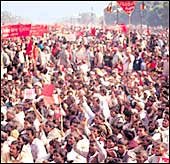 |
| BALANCING ACT: Chidambaram's
budget is clever, both politically and economically. And it
deserves a chance |
The
budget he presented on February 28, 1997, will always haunt Palaniappan
Chidambaram, the young-looking 59-year-old lawyer (he also has an
MBA from that Mecca of capitalist-philosophy, Harvard) who is now
into his second term as India's Finance Minister after eight years
in relative political wilderness-he was fm in 1996 and 1997, but
wasn't even a member of Parliament from 1998 to 2004. Assorted economists,
captains of Indian industry and busy-bodies flitting about from
one television studio to another proffering similar sound-bites
on Budget 2004 have pronounced their judgment: Budget 1997 was a
dream; Budget 2004 is a balancing act, barely reformist, heavily
skewed towards the agricultural and rural economy, and all about
a return to Big Government. "It is a reasonably good budget
given the political compulsions," says Arun Bharat Ram, Vice
Chairman, SRF Limited. Given that this writer has had the benefit
of 72-96 hours more to analyse the Budget and check his numbers
and reasoning in a snappy interview with the Finance Minister he
would like to offer a contrarian take: Budget 2004 is reformist
(that's a relief!). And ceteris paribus, to resort to an old favourite
of economists, it will likely have a more beneficial impact on India's
economy than any other Budget in recent times, including the 1997
one.
There can be no denying the fact that the Budget
is replete with political sops. The Bihar package, some Rs 3,225
crore worth of it, the desalination plant at Chennai, construction
of an international container trans-shipment terminal at Kochi port,
and establishing a special purpose vehicle to raise funds for the
Sethusamudram ship canal project, all have more to do with keeping
the constituents (and allies) of the UPA happy, less to do with
Budget 2004's singular theme: equitable development. There is also
no denying the fact that Chidambaram has cobbled together, in a
mere 46 days-he admits that the only constraint in putting together
the Budget was time; see "The Economy Will Get Stronger Irrespective
Of Who The Finance Minister Is", page 36-a Budget of the kind
that the economy most needs right now. If more people haven't seen
it as such, blame it on the either-or India-Bharat metaphor that
some analysts have used to describe the Budget. At the core of this
argument lies the belief that the urban, industrial and services
economy can only grow at the cost of the rural agricultural one
and vice versa. No, says Budget 2004, and bravely attempts to chart
a growth path that marries the interests of the three sectors. "This
is a budget to build Bharat," says Sunil Bharti Mittal, CEO,
Bharti Tele-Ventures. And, it is also a Budget to build India, if
at all the two are different.
|
SOMETHING FOR EVERYONE
|
 FARMERS FARMERS
» Doubling
of agricultural credit in the next three years
»
Rs 2,800 crore allocated for the Accelerated Irrigation
Benefit Programme
»
Massive scheme to repair, renovate and restore all water
bodies linked to agriculture
»
To launch a National Horticulture Mission to double
horticulture production by 2011-12
»
Rs 8,000 crore earmarked for Rural Industrial Development
Fund
 THE
LEFT PARTIES THE
LEFT PARTIES
»
Two per cent education cess on all taxes
»
Food for Work programme to be launched in 150 of the
poorest districts in the country
»
The Universal Health Insurance Scheme to be made exclusive
for below poverty line families
»
Establishment of a Board for Reconstruction of Public
Sector Enterprises
»
Setting up of a Backward States Grant Commission for
backward states
 THE
REFORMERS THE
REFORMERS
»
Hike in ceilings on foreign direct investment in telecom,
civil aviation, and the insurance sector
»
Reduction of revenue deficit to 2.5 per cent and the
fiscal deficit to 4.4 per cent of the GDP
»
13 more services to fall under the service tax regime
»
85 items dereserved from list of businesses reserved
for the small scale sector
»
Rs 4,000 crore to be raised through disinvestment
 INDUSTRY INDUSTRY
»
Funding of infrastructure projects related to airports,
seaports and tourism through the Inter-Institutional Group
»
Setting up of an Investment Commission to woo domestic
and foreign investors
»
Setting up of a National Manufacturing Competitiveness
Council to suggest measures for improving competitiveness
»
Value-added tax to be implemented countrywide on April
1, 2005
»
Tonnage tax option introduced for shipping companies
 SALARYMEN SALARYMEN
»
Non-taxable income raised to Rs 1,00,000
»
Contributions to the new pension scheme (which came
into effect on Jan 1) and accrued interest to be exempt from
tax
»
Interest rates on small savings instruments such as
PPF and post office saving schemes to continue to be 8 per
cent
|
Agriculture and the rural economy, Chidambaram's
reasoning goes, will be the key drivers of growth. "Factor
out agriculture and draw a line (of the GDP growth rate),"
he says. "It will more or less be a straight one; it is only
when agriculture does well that GDP growth peaks." That's an
accurate statement: in 2003-04, when the economy grew at 8.2 per
cent, agriculture grew at 9.1 per cent; and in 1996-97 when the
economy grew at 7.8 per cent, agriculture grew at 9.3 per cent.
The reverse is also true: in 2002-03, when the economy grew by an
anaemic 4 per cent, agriculture declined by 5.2 per cent.
All agricultural reform is targeted at making
the business of farming and other associated businesses more profitable.
By focussing on rural credit, mechanisation, water management, sops
for food-processing firms, and venture capital for agro-product
start-ups that is just what Chidambaram has sought to do. Better
still, as the man himself points out, "The New Deal for agriculture
is (largely) investment-driven, not subsidy- or welfare-driven."
That could explain why Tarun Das, Chief Mentor, Confederation of
Indian Industry, believes (this time, strangely, he belongs to the
minority) that this is a different kind of Dream Budget. "The
1997 Budget had 15 things aimed at the corporate sector," he
explains. "In this Budget, the Finance Minister has done 20
different things to put purchasing power in the hands of people
in the agriculture sector."
Chidambaram's task may have been made easier
by the fact that Industry didn't want anything but to be left alone.
That's all too understandable. In 2003-04, the aggregate net profits
of 3,077 companies increased by 35 per cent over 2002-03; even better,
average net profit margins of 2,916 companies in 2003-04, were,
at 8.1 per cent, far higher than the corresponding figure in 2000-01.
If there's an area of concern, it is that investment by the private
sector in India in the five years ending in 2003-04 was, at Rs 2,82,804
crore, lower than the corresponding figure for 1991-1996. That,
though, could well be because of excess capacity created in the
late 1980s and early 1990s, and even in late 2003, economists were
predicting that if the Indian economy continued to grow at a rate
exceeding 7 per cent, fresh investments would soon be made by the
private sector. Chidambaram, for his part, has ensured that the
conditions remain conducive by declaring his preference for the
continuation of a "benign interest rate regime" and by
not altering anything significantly. If all goes well, says Bharti's
Mittal, "there will be a marginal increase in the income of
the hinterland and this will result in an increase in the sale of
white goods, mobile phones, two-wheelers, and cars". "The
Budget will give a much bigger boost to industry than is being perceived."
 |
| Team Chidambaram: We've all got green
thumb |
He can say that again. The Board of India Today
Economists believes there's more bad, than good in this Budget (see
A Hung Budget..., page 42), and while foreign institutional investors
and companies considering foreign direct investment in India have
reason to cheer-Chidambaram has done his bit in the cause of fiscal
discipline, and actually increased the ceiling on FDI in telecommunications,
civil aviation, and insurance-the stockmarket is still hoping (as
this magazine goes to press on July 12) that the transaction tax
will be reduced from the stated 0.15 per cent. Subir Gokarn, the
chief economist of crisil (and one of the members of bite), believes
that the Budget hasn't done enough to trigger growth. Then, the
two Budgets in the past 10 years that satisfy this criterion didn't
really result in great years for the economy. Chidambaram's Budget
is clever, both politically and economically. And it is, like we
have said before, reformist. Surely, it deserves a chance.
|
